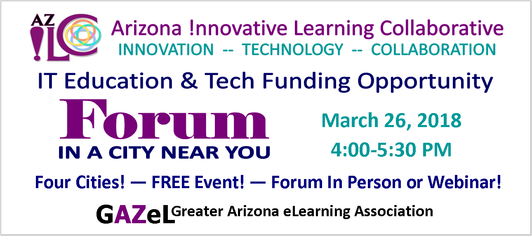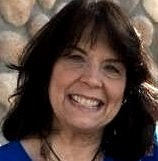|
The FREE Forum will take place simultaneously in four locations:
|
Can't be there in person? Connect by FREE webinar!
Generation Yes IT Education Organization and, Digital Equity/Digital Divide funding opportunities for education institutions and nonprofit organizations

Dr. Dennis Harper, CEO of the national nonprofit Generation Yes
K-12 IT/Computer Science Education program |

Debbie Kovsdy, CEO of the Phoenix based Generation Tech Support a tech startup run by high school students and young adults
|
|
Dr. Harper will introduce you to the GenYes IT and Computer Science program and resources that GenYes can provide to Arizona schools, including examples of successful programs in Paradise Valley and Yuma. Debbie will tell you about Generation Tech Support, a Phoenix tech startup, created in the Paradise Valley School District, run by high school students and young adults that provides tech support and instruction services to the public.
Dennis will also talk about how education institutions and nonprofit organizations can approach banks to access Digital Equity/Digital Divide funding opportunities through the Federal Reserve Community Reinvestment Act (CRA). He will also explore strategies for Arizona to help banks understand the unique role they can play through the CRA. |
Schedule3:45-4:15 Registration 4:15-5:15 Forum 5:30 -7:30 Innovative Learning Collaborators Mixin-It-Up |
CRA funding may support services such as broadband and broadband infrastructure, hardware, tech support, librarian assistance, numeracy (or “math literacy’), financial literacy education, “digital age skills” development (such as coding), and educational content. Many banks have become very interested in addressing the digital divide because it is an increasingly important barrier both to local economic opportunity and vitality, as well as to access to banking services which increasingly are being offered online.
Community Reinvestment Act Digital Equity Funding Opportunities
The federal 1977 Community Reinvestment Act (CRA) requires all banking institutions that receive Federal Deposit Insurance Corporation Insurance (FDIC) to provide equitable access for those living in “low and moderate income” (LMI) communities to banking services as well as investments for community development (i.e., enhancing economic opportunity) in LMI communities. Banks must meet their CRA obligations through a mix of volunteerism, grantmaking and investments.
As a result of advocacy and pilot projects from the National Collaborative for Digital Equity, in 2016 the Federal Reserve issued guidance (Download Below) encouraging the nation’s banks to invest CRA resources in digital equity. The challenge now is to educate banks about how to work with local education organizations to provide digital equity funding , and how educational organizations can apply for support.
NCDE emphasizes that investments that enhance equitable access only to broadband, computers and tech support are insufficient to lead to meaningful impacts for educational and economic opportunity. There is substantial research showing that simplistic investments for technology in schools that don’t address training, technical support, use of engaging instructional strategies, and assistance with literacy and cybersafety skills, are likely to yield limited impact. Thus, banks, foundations and other digital equity investors should make digital equity investments that are “systemic” – supporting an integrated, evidence-based approach to equipping low-income learners with the tools they need to prepare and qualify for living wage careers in STEM and other fields.
NCDE has launched a “One Percent for Digital Equity” campaign, advocating that banks and their community partners nationwide strive to reach a target of one percent of CRA funding to close the digital divide, as this would unleash fully $1 billion annually.
As a result of advocacy and pilot projects from the National Collaborative for Digital Equity, in 2016 the Federal Reserve issued guidance (Download Below) encouraging the nation’s banks to invest CRA resources in digital equity. The challenge now is to educate banks about how to work with local education organizations to provide digital equity funding , and how educational organizations can apply for support.
NCDE emphasizes that investments that enhance equitable access only to broadband, computers and tech support are insufficient to lead to meaningful impacts for educational and economic opportunity. There is substantial research showing that simplistic investments for technology in schools that don’t address training, technical support, use of engaging instructional strategies, and assistance with literacy and cybersafety skills, are likely to yield limited impact. Thus, banks, foundations and other digital equity investors should make digital equity investments that are “systemic” – supporting an integrated, evidence-based approach to equipping low-income learners with the tools they need to prepare and qualify for living wage careers in STEM and other fields.
NCDE has launched a “One Percent for Digital Equity” campaign, advocating that banks and their community partners nationwide strive to reach a target of one percent of CRA funding to close the digital divide, as this would unleash fully $1 billion annually.
Download File - Federal Reserve Digital Divide CRA Guide
|
National Collaborative for Digital Equity
|
| ||||||
GenYes And Generation Tech Support Organizations

Generation YES has spent 20 years developing programs which systemically address the digital divide . Generation YES recognizes that schools are the foundation for communities and believes that focusing on education programs for underserved youth is the best approach towards solving the diverse and complex issues facing communities on the wrong side of the digital divide. Specifically, Generation YES programs focus on:
- Training youth to provide tech support and mentoring in their schools, homes, and communities.
- Developing leadership opportunities for underserved youth to build confidence and communication skills.
- Enhancing digital literacy including cyber safety and digital citizenship
- Building workforce readiness skills for "middle-skill" jobs- jobs that don't require a college degree but pay above the national living wage.
GenYes Videos - GenYes In Action In Arizona
The best two ways to see GenYES are by watching these two short (4 minutes total) videos and hearing from the teachers and students themselves about the impact of the GenYES program.
- Yuma, Arizona: https://vimeo.com/user2973806/genyes-in-action
- Los Angeles, California: https://vimeo.com/23713389
GenYes Documents
|
|
|
| ||||||||||||||||||||||||
Generation Tech Support

Generation Tech Support, is a Phoenix tech startup run by high school students and young adults. Tech savvy students provide tech support and instruction to the public. Many people need tech help in navigating smart phones, tablets, mac/pc updates and struggle with the complexities of millions of apps. Our tech savvy students, called GenTechs, intuitively trouble shoot issues, offer suggestions and focus on the specific needs of each customer. In the process, GenTechs learn workplace skills, how to run a business from the ground up and participate in all facets of the day to day business operations. GenTechs also be provide tech service to the younger crowd in robotics, coding, and various tech camps, assist in professional development training to schools and facilitate businesses traininings.
Who Should Attend
Education institutions, nonprofit organizations and government agencies interested in learning about the GenYes IT Training Program for students and how educational institutions and nonprofit organizations can approach banks to utilize their required Community Reinvestment Act (CRA) funds to support digital equity/digital divide initiatives such as broadband and broadband infrastructure, hardware, tech support, librarian assistance, numeracy (or “math literacy’), financial literacy education, “digital age skills” development (such as coding), and educational content.
You will also want to attend the Innovative Learning
Networking festivities following this Forum
Meet Our Presenters
Dr. Harper is the founder and CEO of the nonprofit Generation YES organization. He is widely recognized as one of the world’s eminent leaders in the field of technology in education and has been instrumental in bringing computers and the Internet into thousands of schools in more than thirty nations. Dr. Harper received his Ph.D. in International Education at the University of California in 1983.
Debbie, a retired technology teacher in the Paradise Valley School District, is the CEO of Generation Tech Support, a tech startup run by twenty five high school students and young adults overseen by business professionals and tech instructors. Generation Tech Support was an entrepreneurial idea that was developed by Debbie and GenYES students at the Shadow Mountain High School in the Paradise Valley School District. Debbie developed a technology program at the high school that has become a national model for schools. The GenYes program at Shadow Mountain is a spin-off of the national Generation Yes technology program.








